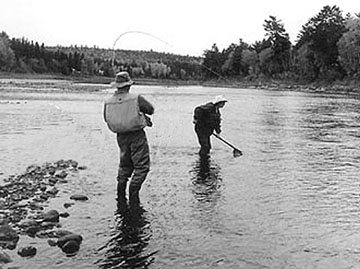|
Volume Four Number One Late Winter 2000 |
|
"It will be the determination of society
whether these efforts result in trying to conserve these stocks
or simply document their extinction." Atlantic Salmon have joined the Alabama Sturgeon and the Bull Trout as one of the most imperiled freshwater fish species in the United States. Where once more than 500,000 salmon returned to the rivers of New England, this year less than 1,500 returns were observed. Despite a population that is less than 0.3% of historic numbers, the U.S. Fish and Wildlife Service (FWS) and National Marine Fisheries Service (NMFS, collectively "the Services") continue to avoid giving the species ESA protection.  On October 1, 1993, several parties petitioned
the Services to list anadromous Atlantic Salmon throughout their
historic range as endangered under the ESA. After reviewing the
petition, the Services concluded wild Atlantic Salmon populations
in seven Maine rivers The 400+ page "Atlantic Salmon Conservation
Plan for Seven Maine Rivers" (State Plan) was the product
of an industry-dominated, governor-appointed task force. The
record shows that the goal of the State Plan is to derail protecting
Atlantic Salmon under the ESA, 1998 saw the creation of a conservation coalition that includes Defenders of Wildlife, Conservation Action Project, Forest Ecology Network, Biodiversity Legal Foundation, and others. On January 27, 1999 the coalition, represented by Howard Crystal of Meyer & Glitzenstein, filed a lawsuit challenging the Services' decision not to protect the critically imperiled Atlantic Salmon. In an apparent response to the lawsuit, on November 17, 1999 the Services published a notice in the Federal Register proposing Atlantic Salmon populations in eight Maine rivers be listed as "endangered." At the same time, the Services filed a brief claiming that the salmon were not threatened with possible extinction, at least not in 1997, when they accepted the State Plan in lieu of listing. Two years later the services proposed the species as "endangered?" Go figure. The cause of the decline of Atlantic Salmon
remains hidden, yet some answers are emerging. A study on the
Narraguagus River in Maine has uncovered a 70 to 90 percent over-wintering
mortality of young salmon. This compares with an expected 40-50
percent As a result of the "discovery" aspect of the lawsuit, we have learned that the failure of the Services to list Atlantic Salmon is laced with political blackmail. Back in February, 1995 then Senator William Cohen (R, ME, now Secretary Of Defense) wrote to Secretary of the Interior Bruce Babbitt and Secretary of Commerce the late Ron Brown, about his concerns with protecting Atlantic Salmon under the ESA. Cohen concluded his letter by stating, "The disposition of this petition will greatly affect my views regarding changes to the Endangered Species Act that might be warranted." According to one document in the administrative record from a NMFS official: "Babbitt took this [Cohen's letter] very seriously and has requested that the Federal Register notice be redrafted to state that the petitioned action is not warranted. . . The Regional office [NMFS] is in a very awkward position, we are being asked by FWS's RO [Regional Office] to edit a FR [Federal Register] notice that we don't agree with . . ." In another memo from a NMFS fishery biologist:
". . . the Region's petition findings may be dramatically
altered from a proposed rule to a petition denial. . . It is
my opinion that the On December 2, 1999, Governor Angus King ventured
onto the internet to give a speech about the recent proposal
to list Atlantic Salmon as endangered. According to the governor,
"most of the problems affecting Maine salmon lie outside
our [Maine] borders," and giving The Governor erroneously claimed that "most of the life cycle of the salmon takes place - and is subject to risks - far from our shores." The average life of an Atlantic Salmon is five years, three in the rivers, two in the ocean. But hey, why should facts get in the way of theater? The Governor also stated that he has "begun
discussions with the Attorney General to see that our legal options
are fully pursued and fully protected." While the State
of Maine is an intervenor in the present litigation to get the
species protected, three of the governor's While many proposals to list species under the ESA appear to have been influenced by "politics," there is clear evidence that Secretary Babbitt allowed factors other than science to influence a decision that could lead to the possible extinction of wild Atlantic Salmon. While this is a violation of the law, it also has serious ethical questions. Secretary Babbitt should be held to answer for his actions or he should resign. And the governor of Maine appears to be attempting to create controversy by ignoring the facts or the truth. After almost six years in office, Mr. King has little to show for a legacy. At his present rate, his legacy will be the extirpation of wild Atlantic Salmon from Maine. Giving a species protection under the ESA is an action of last resort. The ESA is a safety net; all other actions have failed to stop the slide to extinction. Putting politics ahead of the extinction of a species puts our own future into jeopardy. David Carle is the executive director of the Conservation Action Project, 15 Tanguay Ave., Box #2, Nashua, NH 03036 phone: (603) 882-6520 Other Articles About Atlantic Salmon in This Issue Quisling Rivalry Atlantic Salmon Hearings Testimony at Salmon Hearings Will We Ever Learn: Report of the Commission to study the Atlantic Salmon (1947) A Fish Tale of Two States |